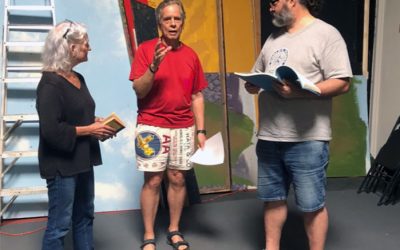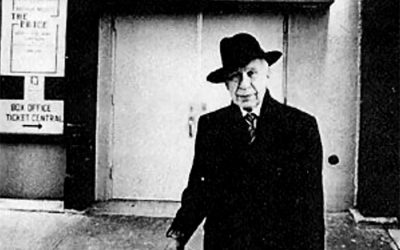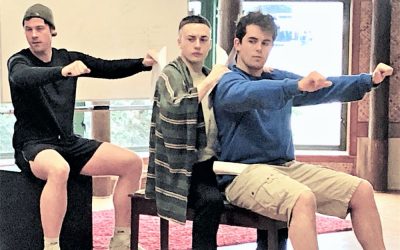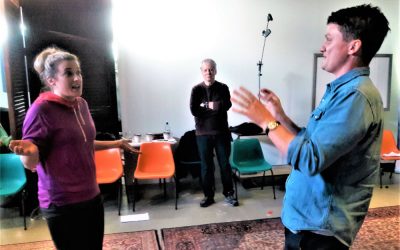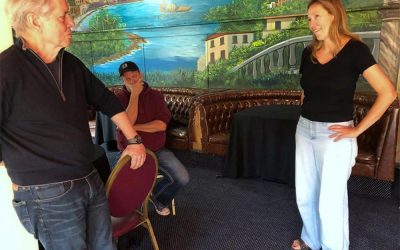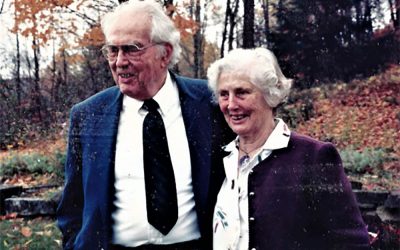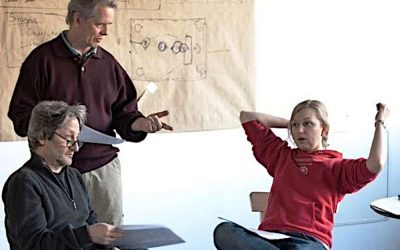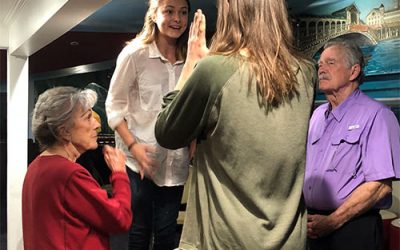Blogs and Stories
by Mark and Elsha Travis
Mark W. Travis on Interrogating a Character
In a Travis International Film Institute webinar, Mark W. Travis both demonstrates and explains his director-centered approach designed to efficiently generate organic and authentic performances from actors. The Travis Technique utilizes an interrogation process that peppers characters with a series of questions that shift from curiosity, to criticism, to support at the whim of the interrogator.
The Problem with Characters
At the core of your story are your characters. At the core of your characters are their hopes, dreams, fears, sorrows, shames, etc. that drive them to action and, in turn, drive your story.
Why?
There are films that do everything right: powerful story, great characters, exciting events, cinematography, sound, setting, the works… and yet… yet… something is missing because I don’t feel it. I’m not moved. Why?
Thank you, Mr. Clurman
For over forty years I’ve had a love/hate relationship with the world of the director. I love the fact that there is always so much to learn and that every day there are new discoveries, new techniques revealed and new books and DVDs detailing the work of other directors. And I hate the fact that there is so much to learn, that I can never catch up, I can never learn it all, never read it all, never try it all. There is a part of me that wants it all to end, that wants to say, “Now I’m done. There is no more learning to do.”
Why Do You Hate Scene Study Classes?
An email exchange with writer/actor Tamara Branch where I get to sound off about Scene Study classes.
Mark, I have a quick question. I remember you said you hated scene study classes. I forgot why. Why? Just wondering. I know there was a good reason.
Which Truth Do I Write?
Before each TRAVIS TECHNIQUE workshop, directors are tasked with writing a 3-minute autobiographical story, based on an event in their life.
This is a letter from New Zealand director, Charlie Haskell, who is writing about a motorcycle trip he took with two of his friends 28 years ago.
The Casting Conundrum
Beginning a new relationship can be both exciting and challenging. In the world of filmmaking, directors initiate many relationships, the most vital and crucial being the ones you have with actors.
Director/actor relationships are like none other in life. Their goal is to create believable characters that exist in a fictional world.
The Actor’s Journey
Actors are amazing. They willingly thrust themselves into the persona and life experiences of another character. We, directors, are constantly challenging them, provoking them, and hopefully inspiring them to fully embody the emotional states of these characters.
Yet, what many directors overlook, or are not aware of, is that there is an evolutionary change in every actor as they move through the key phases of filmmaking: Auditions, Rehearsal and Production.
Dead Lines
It’s 1995, early in my teaching career, and my parents are visiting me in Los Angeles. Because I am always looking for something to impress my father with, something that would make him proud of me, I show him a brochure of a seminar that I will be teaching. It’s a very detailed brochure with bullet points of all the aspects of directing that I promised to cover. I am watching as he reads every line of the brochure, making those little ‘hmm’ sounds as he absorbs the information.
Four Reasons Not to Rehearse
In the world of theater, rehearsal is all we have before we perform for the public. The rehearsal process is where all the trial and error happens, where we discover what will work and what won’t. The rehearsal process is where final decisions are made, where the characters and scenes are shaped and honed, where the pacing and rhythm of the production is determined. Or as Robert Altman, says, “The rehearsal process in theater is like the editing process in film.” It is where the final product is discovered.
Elephant in the Room
We’ve all been there. In the room. Any room. And we’re keenly aware of the elephant … in the corner … on the couch … behind the desk … wherever. We know we don’t want to talk about it (otherwise the elephant wouldn’t be there) and we’re hoping nobody else does either. Or perhaps we’re hoping that someone else will bring it up to get us off the hook. That way we won’t be blamed for mentioning it and we can claim we had no idea it was even there.
The Battle Against Fear
I’m looking into the eyes of a very talented, very famous, very angry actress. I am her director and we are at a crossroad. It’s only a few days until the opening of the play that we’ve been rehearsing for weeks and my Emmy-winning actress is having a meltdown. She’s looking to me to make everything right. The problem is, I’m not sure what’s wrong. Of course we’ve had our differences during the rehearsal process, that’s normal. But at this moment the only thing I see panic is in her eyes, I see rebellion, I see fear.
The Director – Actor Dance
As far as relationships go I propose the one between actors and directors is one of the most challenging. It is extremely demanding and often misunderstood. Just think about it. A director gets a script that is full of complex characters and the director needs actors to portray those characters. No problem. There are thousands of available actors from which the director can choose. But … once the selection has been made the trouble begins. It’s like dancing a waltz and both you and your partner are trying…
Blogs
Mark W. Travis on Interrogating a Character
In a Travis International Film Institute webinar, Mark W. Travis both demonstrates and explains his director-centered approach designed to efficiently generate organic and authentic performances from actors. The Travis Technique utilizes an interrogation process that peppers characters with a series of questions that shift from curiosity, to criticism, to support at the whim of the interrogator.
The Problem with Characters
At the core of your story are your characters. At the core of your characters are their hopes, dreams, fears, sorrows, shames, etc. that drive them to action and, in turn, drive your story.
Why?
There are films that do everything right: powerful story, great characters, exciting events, cinematography, sound, setting, the works… and yet… yet… something is missing because I don’t feel it. I’m not moved. Why?
Thank you, Mr. Clurman
For over forty years I’ve had a love/hate relationship with the world of the director. I love the fact that there is always so much to learn and that every day there are new discoveries, new techniques revealed and new books and DVDs detailing the work of other directors. And I hate the fact that there is so much to learn, that I can never catch up, I can never learn it all, never read it all, never try it all. There is a part of me that wants it all to end, that wants to say, “Now I’m done. There is no more learning to do.”
Why Do You Hate Scene Study Classes?
An email exchange with writer/actor Tamara Branch where I get to sound off about Scene Study classes.
Mark, I have a quick question. I remember you said you hated scene study classes. I forgot why. Why? Just wondering. I know there was a good reason.
Which Truth Do I Write?
Before each TRAVIS TECHNIQUE workshop, directors are tasked with writing a 3-minute autobiographical story, based on an event in their life.
This is a letter from New Zealand director, Charlie Haskell, who is writing about a motorcycle trip he took with two of his friends 28 years ago.
The Casting Conundrum
Beginning a new relationship can be both exciting and challenging. In the world of filmmaking, directors initiate many relationships, the most vital and crucial being the ones you have with actors.
Director/actor relationships are like none other in life. Their goal is to create believable characters that exist in a fictional world.
The Actor’s Journey
Actors are amazing. They willingly thrust themselves into the persona and life experiences of another character. We, directors, are constantly challenging them, provoking them, and hopefully inspiring them to fully embody the emotional states of these characters.
Yet, what many directors overlook, or are not aware of, is that there is an evolutionary change in every actor as they move through the key phases of filmmaking: Auditions, Rehearsal and Production.
Dead Lines
It’s 1995, early in my teaching career, and my parents are visiting me in Los Angeles. Because I am always looking for something to impress my father with, something that would make him proud of me, I show him a brochure of a seminar that I will be teaching. It’s a very detailed brochure with bullet points of all the aspects of directing that I promised to cover. I am watching as he reads every line of the brochure, making those little ‘hmm’ sounds as he absorbs the information.
Four Reasons Not to Rehearse
In the world of theater, rehearsal is all we have before we perform for the public. The rehearsal process is where all the trial and error happens, where we discover what will work and what won’t. The rehearsal process is where final decisions are made, where the characters and scenes are shaped and honed, where the pacing and rhythm of the production is determined. Or as Robert Altman, says, “The rehearsal process in theater is like the editing process in film.” It is where the final product is discovered.
Elephant in the Room
We’ve all been there. In the room. Any room. And we’re keenly aware of the elephant … in the corner … on the couch … behind the desk … wherever. We know we don’t want to talk about it (otherwise the elephant wouldn’t be there) and we’re hoping nobody else does either. Or perhaps we’re hoping that someone else will bring it up to get us off the hook. That way we won’t be blamed for mentioning it and we can claim we had no idea it was even there.
The Battle Against Fear
I’m looking into the eyes of a very talented, very famous, very angry actress. I am her director and we are at a crossroad. It’s only a few days until the opening of the play that we’ve been rehearsing for weeks and my Emmy-winning actress is having a meltdown. She’s looking to me to make everything right. The problem is, I’m not sure what’s wrong. Of course we’ve had our differences during the rehearsal process, that’s normal. But at this moment the only thing I see panic is in her eyes, I see rebellion, I see fear.
The Director – Actor Dance
As far as relationships go I propose the one between actors and directors is one of the most challenging. It is extremely demanding and often misunderstood. Just think about it. A director gets a script that is full of complex characters and the director needs actors to portray those characters. No problem. There are thousands of available actors from which the director can choose. But … once the selection has been made the trouble begins. It’s like dancing a waltz and both you and your partner are trying…
Locations
Honolulu, Hawaii
Los Angeles, California
Prague, Czech Republic
Cologne, Germany
Auckland, New Zealand

